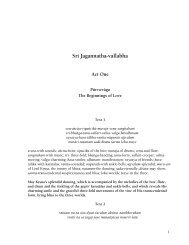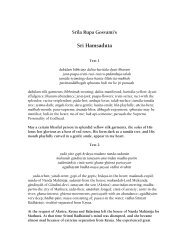Srimad Bhagavatam, Volume 3
Srimad Bhagavatam, Volume 3
Srimad Bhagavatam, Volume 3
You also want an ePaper? Increase the reach of your titles
YUMPU automatically turns print PDFs into web optimized ePapers that Google loves.
<strong>Srimad</strong> Bhagawatam, First Canto, <strong>Volume</strong> Three<br />
to Dhritarastra that every one has to protect himself by his action and the<br />
Grace of the Lord. One has to execute his duty faithfully depending for the<br />
result on the Supreme Authority. No friend, no children, no father, no brother,<br />
no state and no body else can protect a person who is not protected by the<br />
Supreme Lord. One should, therefore, seek the protection of the Supreme<br />
Lord and the human form of life is meant for seeking that protection. He was<br />
pointed out about his precarious conditions more and more by the following<br />
words.<br />
Andhah pura eva badhiro mandaprajnas cha sampratam<br />
Vishirna danto mandagnih saragah kapham udbahan.<br />
Andha—blind, Pura—From the beginning, Eva—certainly, Badhiro—hard of<br />
hearing, Mandaprajnas—memory shortened, Cha—and, Sampratam—<br />
recently, Vishirna—loosened, Danto—teeth, Manda gnih—Liver action<br />
decreased, Saragah—with sound, Kapham—coughing mucus, Udbahan—<br />
coming out.<br />
(Personally) you are blind from the very beginning of your birth and<br />
there is no doubt about it and recently you have become hard of hearing,<br />
your memory shortened and intelligence disturbed your teeth loosened<br />
and the liveraction being decreased, you are coughing with sound and<br />
mucus coming out.<br />
The symptoms of oldage which had already developed in the person of<br />
Dhritarastra were all one after another pointed out to Dhritarastra to give him<br />
warning that death was nearing very quickly and still he was foolishly<br />
carefree about his futnre. The signs pointed by Vidura in the body of<br />
Dhritarastra were signs of Apakshaya or dwindling of the material body<br />
before the last stroke of death. The body is born, it develops, stays, creates<br />
other bodies, dwindles and then vanishes. But foolish man wants to make a<br />
permanent settlement of the perishable body and thinks that his estate,<br />
children, society, country etc will give him protection. With such foolish ideas<br />
he becomes overtaken by such temporary engage ments and forgets altogether<br />
that he has to give up this temporary body and take a new one again to arrange<br />
for another term of soceity, friendship and love again to be perished<br />
ultimately. He. forgets his permanent identity and becomes foolishly active<br />
for the non-permanent occupations forgetting altogether his prime duty. Saints<br />
and sages like Vidura approach such foolish utopians to awake them to the<br />
real situation but the foolish utopians take such Sadhus and saints as parasites<br />
of the society and almost all of them refuse to give aural reception to the<br />
words of such Sadhus and saints although they welcome such show bottle<br />
Sadhus (? ) and so-called saints who can satisfy the foolishman's sense<br />
gratification. Vidura is not a Sadhu to satisfy the lll-gotten sentiments of<br />
Dhritarastra and he was correctly pointing out the real situation of life and<br />
how to save oneself from such catastrophies.<br />
Aho mahiayashi jantor jivitasha yatha bhavan<br />
Bhima apavarjitam pindam adatte grihapalavat.<br />
Alas ! how much powerful is the hope of a living being to continue a life<br />
as much as you are living just like a household dog eating the remnant<br />
bits of foodstuff given by Bheema !<br />
A sadhu is never meant for flattering a king or a reach man for living<br />
comfortably at their cost. A sadhu is to speak the bare truth to the compact<br />
householders about the naked truth of life so that one may come to his senses<br />
about the precarious life in material existence. Dhritarastra is a typical<br />
example of attached old man in husehold-life. He had become a popper in the<br />
true sense and still he wanted to live comfortably in the house of the Pandavas<br />
of whom Bheema specially is mentioned because personally he killed two<br />
prominent sons of Dhritarastra nameley Duryodhone and Duhsasan. These<br />
two sons of Dhritarastra were very much dear to him for their being notorious<br />
in nefarious activities and Bheem is particularly pointed out because it is he<br />
who killed these pet sons of Dhritarastra. And why he was living there at the<br />
house of the Pandavas ? Because Dhritarastra wanted to continue his life<br />
comfortably even at the risk of all humiliation from the point of his own<br />
poistion. Vidura therefore, became astonished how much powerful is the<br />
sense of continuing life of the living being. This sense of continuing one's life<br />
indicates that a living being is eternally living entity and he does not want to<br />
change his habitation of the body. The foolishman does not know that a<br />
particular term of bodily existence is awarded to him to undergo a term of<br />
imprisonment and the human body is awarded, after many many births and<br />
deaths, as a chance for self-realisation and thus go back to home go back to<br />
Godhead. But persons like Dhritarastra try to make plans to live here in a<br />
comfortable position with profit and interest and he does not see things as<br />
they are. The things are different from his utopian conception of life but he is<br />
blind like Dhritarastra and continue to hope for living comfortably in the<br />
midst of all kinds of reverses of life. A Sadhu like Vidura is meant for<br />
awakening such blind persons like Dhritarastra and thus help him going back<br />
to Godhead where life is eternal once going there no body wants to come back<br />
to this material world of miseries. We can just imagine how much important<br />
and responsible task is entrusted to a Sadhu like Mahatma Vidura.<br />
6<br />
Agnir nisristo dattas cha garo daras cha dushitah<br />
Hritam kshetram dhanam yesam tad dattair asubhih kiyat.<br />
Agnir—fire, Nisristo—set in, Dattas—given, Cha—and, Garo—poison,<br />
Daras—married wife, Dushitah—insulted, Hritam—usurped, Kshetram—<br />
kingdom, Dhanam—wealth, Yesam—of those, Tad—their, Dattam—given<br />
by, Asubhih—subsisting, Kiyat—is unnecessary.<br />
There is no necessity of living a degraded life subsisted by the charity of<br />
those whom you tried to kill by setting on fire in their house by<br />
administering poison, by insulting their married wife, by usurping their<br />
kingdom and wealth.<br />
The system of Varnashram religion sets aside a part of one's life completely<br />
for the purpose of self-realisation and attainment of salvation in the human<br />
form of life. That is a routine division of life but persons like Dhritarastra<br />
even at their weary ripen age want to keep up at home even in a degraded<br />
condition as to accept charity from enemies. Vidura wanted to point out this<br />
anomaly in his brother's life and impressed upon him that it was better for him<br />
to die like his sons than accepting such humiliating charity. Five thousands of<br />
years before there was one Dhritarastra but at the present moment there are<br />
full of Dhritarastras in every home. Specially the politicians do not wish to<br />
retire from political activities unless they are dragged by the cruel hand of<br />
death or killed by some opposing element. To stick to family life up to the end<br />
of one's human life is the grossest type of degradation and there is absolute<br />
need of educating such Dhritarastras by the Viduras even at the present<br />
moment.<br />
Tasya api taba deha ayam kripanasya jijivishoh<br />
Paraiti anichhato jeerno jaraya vasasi iva.<br />
Tasya--of this, Api--inspite of, Taba--your, Deha--body, Ayam--this,<br />
Kripanasya--of one who is miserly, Jijivishoh--of you who desire life, Paraiti-<br />
-will dwindle, Anichhato--even unwilling, Jeerno--deteriorated, Vasasigarments,<br />
Iva--like.<br />
Inspite of your such wishful desire for living even at the cost of honour<br />
and prestige your miserly body will certainly dwindle like the<br />
deteriorated old garment although you are unwilling to die.<br />
The words Kripanasya jijivisho, are significant. There are two classes of men.<br />
One is called the 'Kripana' and the other is called the 'Brahamana' The<br />
'Kripana' or the miserly man has no estimation of his material body but the<br />
'Brahmana' has a true estimation of of himself and the material body. The<br />
kripana having wrong estimation of his material body, wants to make sensegratification<br />
to the utmost strength and even in old age also he wants to<br />
become a youngman by medical treatment or otherwise. Dhritarastra is<br />
addressed herein as the Kripana because without any estimation of his<br />
material body he wants to live at any cost and Vidura is trying to open his<br />
eyes that he cannot live more than his term of living and he must be prepared<br />
for death. Death being inevitable why shonld he accept such humiliating<br />
positon for living better take the right path even at the risk of death. Human<br />
life is meant for finishing all kinds of miseries of material existence and life<br />
should be so trained up as one can achieve the desired goal. Dhritarastra due<br />
to his wrong conception of life, had already spoiled 80% of his achived<br />
energy and it was good for him to utilise the remaining days of his miserly<br />
life; it might be utilised for the ultimate good. Such life like that of<br />
Dhritarastra is called miserly because they cannot properly utilise the assets of<br />
the human form of life. Such miserly man by good luck only meets selfrealised<br />
soul like Vidura and by his instruction get rid of the nescience of<br />
material existence.<br />
Gataswartham imam deham virakto mukta bandhanah<br />
Avijnatargatir jahyat sa vai dheera udahrita.<br />
Gataswartham--without being properly utilised, Imam--this, Deham--material<br />
body, Virakto--indifferently, Mukta--being freed, Bandhanah--from all kinds<br />
of obligations, Avijnatargatir--unknown, Jahyat--one should give this body,<br />
Sa--such person, Bai--certainly, Dheera--undisturbed, Udahrita--is said to be<br />
so.<br />
The person who quits his material body which is not properly utilised, in<br />
an unknown destination indifferently and freed from all obligations, is<br />
called undisturbed.<br />
Narottamdas Thakura great devotee and Acharya of the Goudiya Vaisnava<br />
sect has sung like this. "My Lord I have simply wasted my life. Having<br />
obtained the humanly body I have neglected to worship your Lordship and<br />
therefore willngly I accepted poison". In other words the humanly body is<br />
specially meant for cultivating knowledge of devotional service of the Lord<br />
without which the life becomes full of anxieties and miserable conditions<br />
Therefore, those who have spoiled their life without such cultural activities,<br />
such persons are advised to leave home without any knowledge of friends and<br />
relatives and being freed from all obligations of family, society, country etc<br />
and thus give the body up at some unknown destination so that others may not<br />
konw where and how such person has had met his death. "Dheera" means one<br />
who is not disturbed even there is sufficient provocation or causes of












